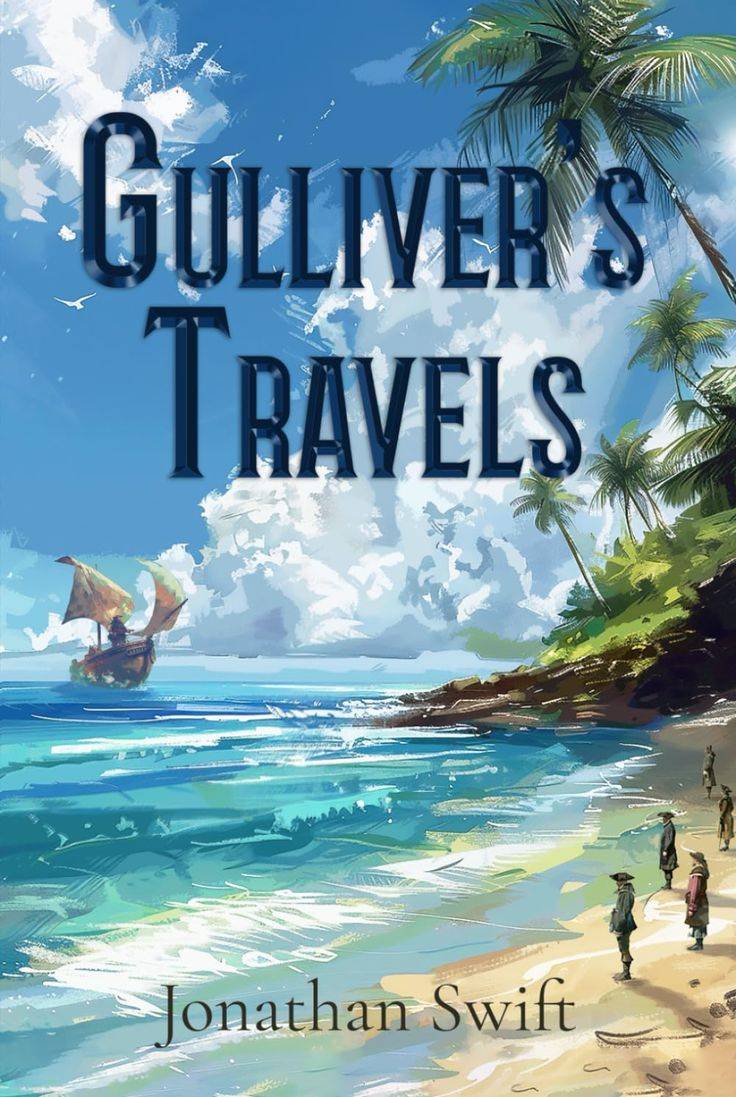Published in 1726, Gulliver’s Travels by Jonathan Swift remains one of the most celebrated works of satire in English literature. Though often mistaken for a children’s book due to its fantastical voyages, the novel is a sharp critique of human nature, politics, and society. Through the adventures of Lemuel Gulliver, Swift cleverly exposes the flaws and absurdities of the world he lived in, many of which still resonate today.
The Structure of the
Swift divides Gulliver’s Travels into four distinct parts, each recounting a voyage that takes the protagonist to a strange and unfamiliar land. These journeys, while filled with adventure and wonder, serve as allegories for deeper social and political commentary.
1. Lilliput: The Land of the Small
2. Brobdingnag: The Land of the Giants
3. Laputa, Balnibarbi, Luggnagg, Glubbdubdrib, and Japan: The World of the Absurd
4. The Land of the Houyhnhnms: The Ideal Society
Each of these travels shapes Gulliver’s worldview, and by the end of the novel, he undergoes a dramatic transformation that leaves him disillusioned with humanity.
Lilliput: A Mirror of Political Pettiness
Gulliver’s first journey takes him to Lilliput, a land inhabited by people no more than six inches tall. At first, Gulliver is fascinated by their miniature world, but he soon realizes that their small stature is matched by their small-mindedness. The Lilliputians are deeply embroiled in trivial conflicts, such as the long-standing feud between the Big-Endians and Little-Endians over how to properly crack an egg.
This seemingly ridiculous dispute satirizes the real-world conflicts between Catholics and Protestants in Swift’s time. Furthermore, the Lilliputians’ bureaucratic government and their obsession with political intrigue reflect the corruption and pettiness of British politics. Through Gulliver’s experience, Swift highlights how pride and power struggles can make even the most intelligent beings act foolishly.
Brobdingnag: A Giant Perspective on Humanity
In contrast to Lilliput, Gulliver’s second voyage takes him to Brobdingnag, a land of giants where he is the tiny one. Here, he experiences the vulnerability of being physically insignificant, reversing the power dynamics of his previous adventure.
The Brobdingnagians, despite their imposing size, are far more moral and rational than the people of Europe. The king, upon hearing about Gulliver’s homeland, is appalled by the corruption, greed, and constant warfare that define European society. He famously declares that Europeans are nothing more than "odious little vermin."
Through this reversal, Swift forces readers to reflect on their own society. When viewed from an outsider’s perspective, the flaws of human civilization become glaringly obvious. By making Gulliver the small and powerless one, Swift challenges the notion of European superiority and exposes the moral shortcomings of the so-called "civilized" world.
Laputa and the Absurdity of Intellectualism
The third part of Gulliver’s journey takes him to the flying island of Laputa, home to an eccentric group of scientists and intellectuals. The Laputans are obsessed with theoretical knowledge but are completely detached from practical reality. Their experiments-such as trying to extract sunlight from cucumbers-are ridiculous, highlighting Swift’s disdain for impractical scientific pursuits.
This section satirizes the Royal Society and the scientific revolution of Swift’s time. While scientific progress is valuable, Swift warns against blind obsession with innovation at the expense of common sense. The Laputans are so engrossed in their abstract theories that they neglect their basic responsibilities, leading to the suffering of their people.
Gulliver also visits Glubbdubdrib, where he encounters historical figures brought back to life. He learns that many of the great leaders of history were far from the noble figures they are often portrayed to be. This theme of historical revisionism remains relevant today, as societies continue to grapple with the true nature of their past.
The Houyhnhnms: The Ultimate Disillusionment
The final and most profound of Gulliver’s adventures takes him to the land of the Houyhnhnms, a society of intelligent and virtuous horses. In contrast, the Yahoos-wild, depraved, human-like creatures-represent the worst aspects of mankind: greed, selfishness, and violence.
Gulliver is initially fascinated by the Houyhnhnms and their rational, peaceful society. They live in harmony, free from lies, corruption, and war. However, their utopia comes at a cost: they lack passion, emotion, and individuality. Swift seems to suggest that while humanity is deeply flawed, the absence of human complexity is equally troubling.
By the end of this journey, Gulliver has grown to despise his own species. He becomes misanthropic, refusing to associate with humans, including his own family. This drastic transformation underscores one of Swift’s central messages: humanity is deeply flawed, but complete rejection of human nature is not the answer.
Themes and Lasting Impact
Gulliver’s Travels is more than just an adventure story; it is a biting critique of human nature and society. Some of its major themes include:
The folly of pride: Lilliputians and Yahoos are both examples of how excessive pride leads to absurdity and destruction.
The dangers of unchecked power: Each of the societies Gulliver encounters has its own form of power imbalance, reflecting the political corruption of Swift’s time.
The limits of reason: While reason is important, the Houyhnhnms’ cold rationality shows that emotion and imperfection are essential parts of being human.
Despite being nearly 300 years old, Gulliver’s Travels remains highly relevant. Its themes continue to resonate, whether in the context of modern politics, social hierarchies, or the pursuit of knowledge. Swift’s work reminds us to question authority, remain skeptical of blind ambition, and embrace the complexities of human nature.
Conclusion
Jonathan Swift’s Gulliver’s Travels is a masterpiece of satire, blending adventure with profound social commentary. Through Gulliver’s journeys, Swift forces readers to confront uncomfortable truths about their own world. Whether viewed as a political critique, a philosophical exploration, or simply a thrilling adventure, the novel endures as one of the most thought-provoking works in literature. Its ability to hold a mirror up to society ensures that its message remains powerful, no matter the era.



